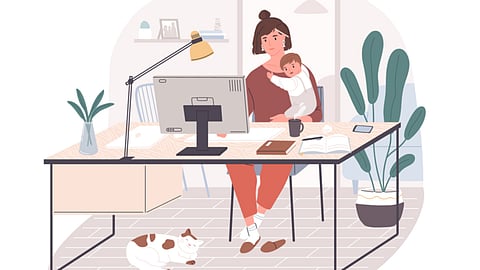Shashi wakes up around 8.00 am, makes herself a cup of coffee, somehow switches on her laptop and gets set for the morning Zoom call. Between waking up and the call, she has around 30 minutes and she tries hard to not sound sleepy as she speaks. She has only slept at 4 am, after binge-watching on a series on Netflix. The meeting ends and she manages to bathe and slip into a new set of pajamas and starts her day. Between assignments and calls she sometimes forgets lunch and then only gets up from the couch, which has been her office for last two years, by 9:00 pm. Working for 12 or even 13 hours is normal and her day is spent in responding to WhatsApp messages, phone calls and Zoom meetings. Prolonged Zoom-fatigue has begun to take a toll.
A Hybrid Life On The Precipice Of Gloom
Work From Home, Hybrid Work, Remote Work: Disruption in the way people work has melted work-life boundaries and the mental health of the seemingly cheerful Zoom-callers are on the precipice of gloom.
Hundreds of work from home (WFH) employees like Shashi have over the last three years started growing into a schedule where their entire waking hours are consumed by assignments, calls and Zoom-meetings because mostly there is nothing else to do. Some only know their colleagues by the display pictures on their phone numbers, everything else weighs much on how someone responds to calls or messages. Zoom fatigue, a sterile disconnect and days based on tasks has begun to dilute the boundaries of work and life and ultimately begun to tell on the mental health of employees. Stress started building slowly, over months. The post-pandemic work style demands new life-management skills.

“It is a strange feeling where work has overtaken my entire day and entire night. Sometimes I catch myself thinking of office issues well after the day is officially over. The so called work-life boundary is long gone and the work from home situation has now become a 12-hour or ever14-hour schedule for many which was earlier just about eight hours. People call at random hours and it has begun to tell on health. Are we ever going to go back to old days of working at office as we once used to? Nobody knows,” Parul Khanna, an employee with a technology company, told Outlook.
A survey report released by Manage Engine, the IT management division of Zoho Corporation, a Chennai-based tech company in July 2021 surveyed 202 companies with more than 500 employees across 18 industry verticals and it showed that almost 95% companies had declared a policy to operate in a work from home policy.
Now with the pandemic situation on the ebb, many can’t wait to join back office. “Remote or work from home was a crisis response, but the entire work for home situation is detrimental toward culture and work from home. Communication gap and errors of interpretation is normal and people just seem to be out of sync. Work is a lot more than just dealing with the tasks of the day,” Sukanya Das Gupta, Director, Marketing at Colliers India said.
For employers, productivity has not suffered much, but it is true that the trustworthiness of on employee has been tested during the pandemic. “Unlike an office work situation where anyone can openly see what someone is doing, it is hard to supervise someone is a work-from-home situation. Tech-based tracking has its limitations, so finally it boiled down to is the relationship between the employee and the employer. So the employers now have to redefine productivity - instead of time at work, productivity will have to be measured against deliverables and the employee-employer relationship has mature to prevent burn-out,” Rajneesh Singh, founder Simply HR, a human resources solutions company, said.
Defining work-life boundaries, getting into the mood for work and being able to tune out of work-mode and create personal time are new life skills that need to be adopted.
Anuttama Banerjee, a Kolkata-based mental health professional said, “The prolonged pandemic has had its impact on the mental health of working professionals and particularly on women who have significant responsibilities at home as well. It is not just a work from home for many; rather it is a contest between work from home and work in home. With extended periods of rigorous work from home, many have lost motivation and seem to be only logged in but distracted. Some also feel compelled to be at the beck and call of the employers and be glued on to chats. Mindlessness and lack of motivation has set in. It is obvious that if employees are not energised, they will not be motivated and also tend to make mistakes. Zoom meetings are not the same as personal meetings,”
Banerjee also thinks that the new realities of work will require new coping skills. Some remedies can be made though – to be able to switch off at a certain time, to have a second phone to socialise with friends and family after work, to sit back and enjoy a good time by oneself even if socialising with others is not possible. In the morning, most people are dragging themselves to the Zoom meetings – but just to get ready and wear fresh clothes and get ready to face the day, or get a coffee at the work table at home, helps the work-ambience to kick in and drive more focused effort. Family members can be told about work-time and family time and thus help one stay motivated,”
While many offices have started getting back to normal schedule, hybrid, remote or fully work-from-home arrangements are here to stay. Just as companies have found new ways of getting work done, employees too will require new life-skills to cope with the post-pandemic work and life.